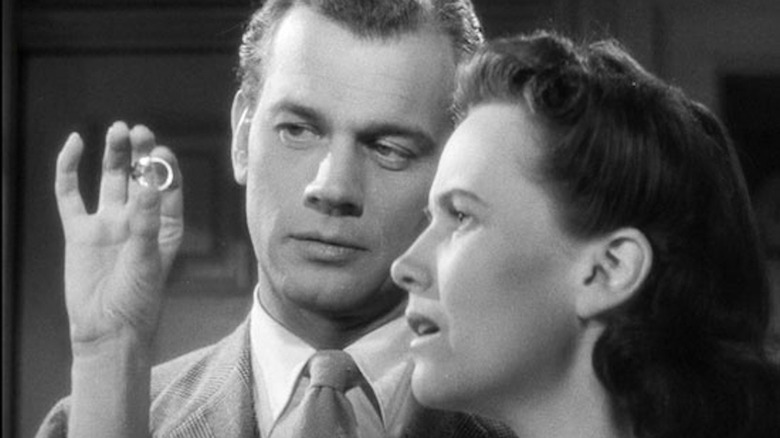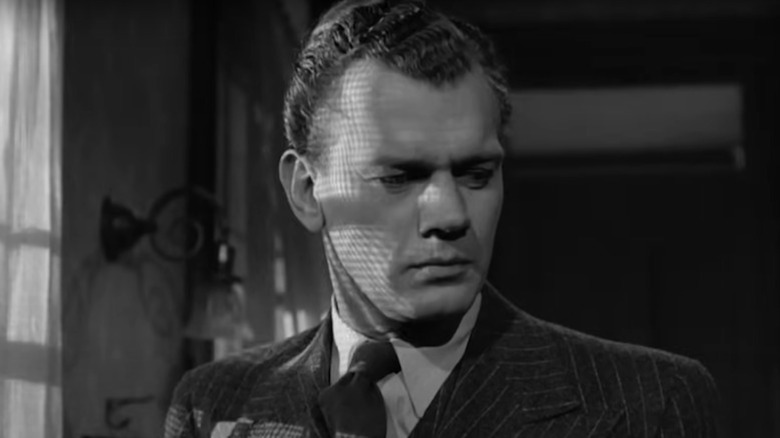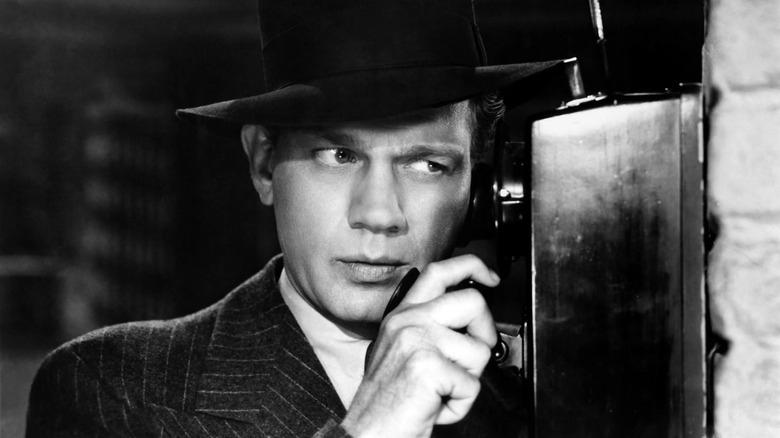Alfred Hitchcock's Favorite Movie Directed By Himself Is A 1943 Thriller
We may receive a commission on purchases made from links.
After a 14-year run as a feature filmmaker in England (which began during the silent era), Alfred Hitchcock was lured to Hollywood by the bold producer David O. Selznick to direct a big-screen adaptation of Daphne du Maurier's thriller novel "Rebecca." Though the two headstrong men clashed throughout the making of the movie, the finished 1940 film was a commercial and critical smash, topping the box office for the year and taking home the Academy Award for Best Picture. If there had been any doubts as to whether the British director's precise manner of visual storytelling, already perfected in triumphs like "The 39 Steps" and "The Lady Vanishes," would translate to Hollywood, they were instantly dispelled.
"Rebecca" would prove to be the least Hitchcockian movie the director would make in America, as the master of suspense wasted no time in reverting to his trademark style for his second (and better) 1940 film, "Foreign Correspondent." Hitchcock remained in this groove over the next couple of years with "Suspicion" (his first with Cary Grant) and "Saboteur" (his most underrated movie) before turning his macabre gaze toward small-town America with the Thornton Wilder-scripted "Shadow of a Doubt."
Hitchcock knocked out more than his share of classics throughout his brilliant career, and there can be no wrong answer when cinephiles name their favorite work of his. "Vertigo," "Psycho," "Rear Window" ... how can you choose just one? (I can, and I choose "Marnie.") But when Hitchcock himself was judging his own work, one title stood out among his many masterpieces. For him, it was that time Uncle Charlie dropped in on his sister's family in Santa Rosa, California in "Shadow of a Doubt."
Suspense is key in Hitchcock's Shadow of a Doubt
Based on a story idea by Margaret McDonnell (the head of Seznick's story department), "Shadow of a Doubt" is easily one of Hitchcock's most suspenseful pictures. (It's also, according to Rotten Tomatoes, one of two perfect movies he made.) The film stars Joseph Cotten as Charlie Oakley, who we know early on in the story to be a murderer of widowers. So there's a palpable tension when he shows up at his sister's house to visit with her family, which includes his dear niece, Charlie (Teresa Wright). The younger Charlie suspects fairly early on that her uncle is being pursued by detectives, and eventually realizes he is the "Merry Widow Murderer." Unfortunately, everyone else in her family and in town thinks Uncle Charlie is a swell guy, so the young woman finds herself alone on a very dangerous island when her namesake is aware she knows his secret.
Several times throughout his career (most notably in his epic conversation with director François Truffaut, reprinted in the book "Hitchcock/Truffaut"), Hitchcock singled out "Shadow of a Doubt" as his personal favorite. He backed off this claim at one point, but reiterated it during an interview on "The Dick Cavett Show"; his daughter Patricia would later confirm this in a 2000 chat with documentarian Laurent Bouzereau (whose "Music by John Williams" just hit Disney+, and is well worth your time). Why did Hitch prize this film above all of his other classics?
Few will ever know the awful truth about Charlie
In the interview with Cavett, Hitchcock expressed a particular affection for the film due to it being a "character picture." It certainly is. Aside from the crackling tension generated by Cotten and Wright, we get to spend time with young Charlie's father Joseph Newton (Henry Travers), and neighbor Herbie Hawkins (Hume Cronyn), both of whom are crime fiction buffs given to sitting out on the front porch and, just for fun, plotting out the perfect murder. The color of "Our Town," the stage play also written by Thornton Wilder, is very much in evidence here, and that makes the sinister presence of Uncle Charlie all the more delicious.
Hitchcock also had this to say to Cavett:
"It was a family in a Northern Californian town, and beloved uncle Charlie comes to stay with them, and what the family don't know is that uncle Charlie is a mass murderer – murdered many women. And the suspense is how long will it be before the family find out the truth. They never do."
That's the wonderful/awful twist to "Shadow of a Doubt": Only young Charlie and the detectives will ever know the truth (because the other suspect in the murders gets killed by the authorities later in the narrative, thus clearing Uncle Charlie). Everyone else will always consider Uncle Charlie's death to be a tragedy, and will only remember him fondly. That's a kick in the ol' conscience, and a fine example of the darkness-in-a-small-town yarn that would get worked over and over before David Lynch dug deep into the muck of it with "Blue Velvet."
Hitchcock's gallows sense of humor would get much darker in time (turning pitch black with the uncomfortably funny "Psycho"), but his understanding of human nature was never more wickedly on point than in "Shadow of a Doubt." You'll never look at your favorite bachelor uncle the same way after watching it.


